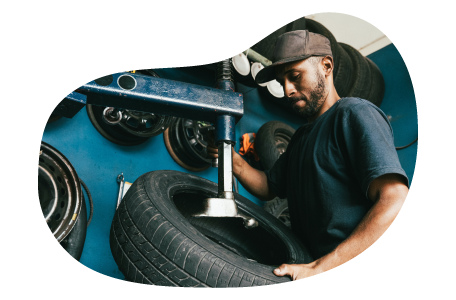
Why do tire dealerships need insurance?
When you work on a customer's vehicle, you take on a lot of risk. An employee could hit a curb when moving a car, or a defective tire could cause an accident. Business insurance provides coverage if you're held responsible for costly repairs or medical payments. You might also need insurance to comply with state laws or the terms of a lease.

Find affordable coverage
Tire dealers can save money on insurance by comparing quotes from top-rated providers.
Fill out Insureon's easy online application to get free quotes and advice from a licensed agent.
Which policies do tire shops need?
These insurance policies cover the most common risks at a tire shop.
General liability insurance
This insurance covers third-party accidents, such as a customer who slips and suffers an injury in your tire shop. It often includes product liability insurance for lawsuits related to defective tires.
- Slip-and-fall accidents
- Customer property damage
- Damages caused by a new tire
Business owner’s policy
A business owner's policy, or BOP, is a cost-effective way for tire shop owners to buy general liability coverage and commercial property insurance together.
- Customer bodily injuries
- Stolen or damaged business property
- Business interruption insurance
Commercial auto insurance
This policy covers injuries and property damage caused by a tire shop's tow truck or other vehicle. Each state has its own requirements for auto liability coverage.
- Injuries caused to another person
- Property damage caused by your vehicle
- Vehicle vandalism and theft
Workers’ compensation insurance
Workers’ comp is required in almost every state for tire businesses that have employees. It also protects sole proprietors from work injury costs that health insurance might deny.
- Employee medical expenses
- Disability benefits
- Lawsuits from employee injuries
Cyber insurance
This policy helps tire stores recover financially from data breaches and cyberattacks. It's recommended for any business that stores credit cards or other personal information.
- Customer notification expenses
- Fraud monitoring services
- Data breach investigations
Commercial umbrella insurance
This policy boosts the limits on a tire shop's general liability insurance, commercial auto insurance, and employer's liability insurance to protect against the most expensive lawsuits.
- Multi-vehicle auto accidents
- Customer injury lawsuits
- Employee injury lawsuits
How much does insurance cost for automotive services?

An independent tire shop with only a few employees can expect to pay less for insurance than a larger business.
Factors that affect auto services insurance premiums include:
- Type of business
- Business property and equipment
- Business income
- Location
- Types of coverage purchased
- Policy limits and deductibles
How do I get tire shop insurance?
It's easy to get tire shop business insurance if you have your company information on hand. Our application will ask for basic facts about your business, such as revenue and number of employees. You can buy a policy online and get a certificate of insurance with Insureon in three easy steps:
- Complete a free online application
- Compare insurance quotes and choose policies
- Pay for your policy and download a certificate
Insureon's licensed insurance agents work with top-rated U.S. providers to find the right insurance coverage and surety bonds for tire dealers, whether you work independently or hire employees. Note that we do not sell insurance for used tire dealers.
Verified business insurance reviews
Hear from customers like you who purchased small business insurance.
Common questions about tire dealer insurance
What additional protection do I need for customers and their vehicles?
These two policies protect against special risks at a tire shop related to customers and their vehicles:
- Garage liability insurance: This policy is similar to general liability insurance, but extends coverage to the additional exposure of garage operations. For example, it would cover a lawsuit from a customer who slipped in an oily spot at your vehicle service center.
- Garage keepers insurance: Businesses that store or service vehicles should carry this coverage. It protects against accidental damage to a vehicle in your care, custody, or control, such as a customer’s car damaged by an employee in your parking lot or mechanic shop.
What other types of insurance coverage do tire shops need?
Tire dealers should consider the following insurance products, which cover additional risks you might encounter:
- Product liability insurance: This policy protects against legal costs related to defective products, such as a new tire in which the tread separates and causes an accident. It's often included with your general liability insurance.
- Errors and omissions insurance (E&O): E&O insurance pays for lawsuits related to professional mistakes and oversights, such as a customer who complains a tire installation was done incorrectly or took longer than promised.
- Business interruption insurance: A BOP often includes business interruption coverage, which covers costs when your tire shop is forced to close temporarily due to a fire, storm, or other covered property claim.
- Equipment breakdown coverage: An endorsement to your commercial property insurance or BOP, this type of insurance covers expenses when your tire shop's equipment or machinery suffers a mechanical failure.
- Surety bonds: A surety bond protects your customers from employee dishonesty and negligent activities. In the event of employee theft or breach of contract, the insurance company will reimburse the customer for their losses.
If your business also offers tire recycling or scrap services, you may be required by your state to purchase a waste tire hauler surety bond.
